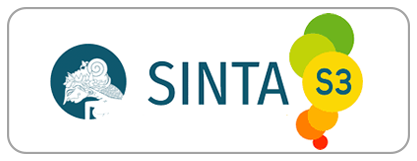Student Academic Fraud: Fraud Diamond Dimensions and Locus of Control
Downloads
Abstract: Student Academic Fraud: Fraud Diamond Dimensions and Locus of Control. This study aims to determine the effect of the fraud diamond and locus of control dimensions on academic fraud behavior. The population of this research is accounting students at the Faculty of Business and Economics, Islamic University of Indonesia, Academic Year 2020/2021 as many as 1,783 students. By using the Slovin formula, the minimum number of samples that meet the Slovin criteria is 95 participants. The sampling method used is convenience sampling by distributing questionnaires via google form so that 261 respondents are collected. The analytical method used to test the research hypothesis is multiple linear regression analysis. The results of this study indicate that the variables of pressure, opportunity, rationalization, and external locus of control have a significant positive effect on student academic fraud behavior. The ability variable was not proven to have a significant positive effect on academic fraud behavior. While the internal locus of control variable proved to have a significant negative effect on academic fraud behavior. The results of this study have implications for higher education institutions to make policies that can reduce student academic fraud.
Keywords: Academic Fraud, Pressure, Opportunity, Rationalization, Capability, Locus of Control
Abstrak: Kecurangan Akademik Mahasiswa: Dimensi Fraud Diamond dan Locus of Control. Penelitian ini bertujuan untuk mengetahui pengaruh dimensi fraud diamond dan locus of control terhadap perilaku kecurangan akademik. Populasi penelitian ini adalah mahasiswa akuntansi di Fakultas Bisnis dan Ekonomika Universitas Islam Indonesia Tahun Akademik 2020/2021 sebanyak 1.783 mahasiswa. Dengan menggunakan rumus Slovin, jumlah minimal sampel yang memenuhi kriteria Slovin adalah 95 partisipan. Metode pengambilan sampel yang digunakan adalah convenience sampling dengan menyebarkan kuisioner melalui google form sehingga terkumpul 261 responden. Metode analisis yang digunakan untuk menguji hipotesis peneltian adalah analisis regresi linier berganda. Hasil penelitian ini menunjukkan bahwa variabel tekanan, kesempatan, rasionalisasi dan locus of control eksternal terbukti berpengaruh positif signifikan terhadap perilaku kecurangan akademik mahasiswa. Variabel kemampuan tidak terbukti berpengaruh positip signifikan terhadap perilaku kecurangan akademik. Sedangkan variabel locus of control internal terbukti berpengaruh negatif signifikan terhadap perilaku kecurangan akademik. Hasil penelitian ini mempunyai implikasi bagi institusi Perguruan Tinggi untuk membuat kebijakan yang mampu mengurangi tindak kecurangan akademik mahasiswa.
Kata kunci: Kecurangan Akademik, Tekanan, Kesempatan, Rasionalisasi, Kemampuan, Locus of Control
Downloads
Copyright (c) 2022 Marfuah Marfuah, Canita Rismatika Dinar, Kinanthi Putri Ardiarmi, Priyono Puji Prasetyo

This work is licensed under a Creative Commons Attribution-ShareAlike 4.0 International License.










 Terjemahan
Terjemahan.png)





